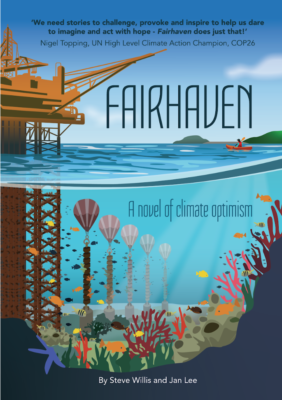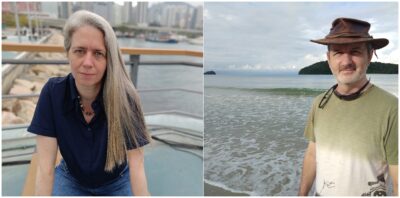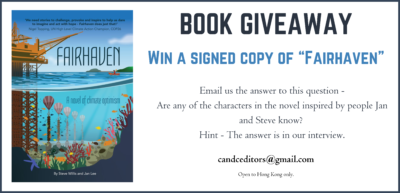
Fairhaven – A Novel of Climate Optimism is an exciting new cli-fi novel that follows a group of visionaries, engineers and innovators striving to bring climate solutions to Southeast Asia and the world. A 2023 Green Stories Novel prize winner, its authors Jan Lee (pen name of Geneviève Hilton) and Steve Willis have over forty years of combined experience in climate protection, innovation engineering, and corporate sustainability.
Fairhaven is an optimistic novel that urges readers to expand their minds and use their imagination. The premise is that there is hope for the future of this planet. While it acknowledges the grim reality of the current climate threat, the novel focuses on possible solutions while telling an exciting, fast-paced story with dynamic characters.
We sit with the two authors to talk more about their novel and the message they want to send out to the world through their book.
I would love to start with a small introduction from each of you.
Steve – I’m a chemical engineer based in Malaysia, working on large-scale climate solutions. Previously, I did environmental work with oil, gas and chemical companies across Asia, resolving numerous seemingly intractable problems and spending large amounts of oil company money to make things better. This novel is directly related to the work I do on a daily basis.
Jan – I recently retired from a long career in corporate affairs and sustainability in Hong Kong, working all over the Asia Pacific region. Now, I’ve become a full-time sustainability activist and writer. I’m also the editor-in-chief of The Apostrophe, a literary magazine published by the Hong Kong Writers Circle.
When did the idea or inspiration of a cli-fi novel first come about? Was it always intended to be co-authored?
Steve – I started writing climate fiction during the COVID-19 lockdowns, initially with the aim of producing an anthology of positive-outcome climate fiction for COP27. No More Fairy Tales was produced with the Green Stories project of Southampton University and contains 24 excellent positive-outcome short stories. Fairhaven evolved from these stories and was, in turn, previewed at COP28 in Dubai last year.
Jan – I started taking fiction seriously again about five years ago, and although I focus mainly on science fiction, I have written on environmental themes before. (In fact, my first published work, at the age of 14, was a one-act play about wetland habitat destruction!) In April 2023, Steve saw my sustainability and literary posts on LinkedIn and approached me to talk about No More Fairy Tales. We decided to collaborate – first on a short story and later on Fairhaven. We wrote the entire book without ever having met each other in real life. We are both new to co-authoring, but it has worked well because we have complementary skill sets: we brought very different points of view and different areas of expertise to the effort. For example, Steve has a greater depth of technical expertise, while I have more experience in developing character arcs.
Your book is about reimagining the future but in a more positive light. How important was it to keep an optimistic tone despite the crisis we know exists in reality?
Steve – Harsh warnings do engage some people, but they also frighten and turn off many others. We wanted to describe a world which shows there are lots of large, positive things to do for all types of roles to inspire engagement and action.
Jan – Keep in mind that the book is not 100% positive: we put our characters through heartbreak, natural disasters, and physical ordeals. But what we want to show is that even when there are setbacks, there is still a possible path forward – and we think it’s easier for our readers to work toward an optimistic future if they can envision what it might look like.
How did your personal expertise and your work with various organizations influence your writing?
Steve – I have used my first-hand experience of large-scale industry to imagine and describe some of the massive solutions that are needed to address the climate crisis. This includes the ships, the oil rigs and the multi-billion-dollar projects that have been delivered to build these huge industries in the first place. Equally ambitious projects need to be deployed to undo the damage that they did.
Jan – I spent a long time working within big organizations and networks, trying to understand questions like, ‘How do decisions get made? Why are some projects funded and others aren’t? Besides money and technology, what else do you need to make something a success?’ It might sound surprising, but these questions are directly related to climate change – because solving the issue isn’t only about deploying the right technologies. It also needs the coordination of large, complex groups of people who each play a different role. I wove many of these aspects into the fabric of the story. And that’s important because no matter what your job or your industry might be, you have a role to play.
Are any of the characters in your book inspired by people you have met or worked with over the years?
Steve – Most of the characters have elements of people I have worked with. Heavy industry is full of widely varied people, and some very strong characters can be seen in the wild, speaking very colourful language.
Jan – Often, the first version of a character in the book was inspired by one particular aspect of a real person. But as we continued to write, we really put our characters through the paces! And all of them somehow developed their own (sometimes surprising) personalities. As it ended up, none of them have specific, real-life counterparts.

Talk to us a little about crafting an Asian female protagonist as a central figure in your book. Why was it important to have a sort of female lead for your story?
Steve – I have worked with some very strong female colleagues. Grace and Marina draw many features from them. In Grace, I also wanted to show a character who could be anyone, male, female, old, young or from any location – a bit of a loner, unusual circumstances, as many people view themselves in their own ways – so that readers would not find it too hard to relate and imagine themselves in her shoes.
Jan – Grace Chan is an everywoman: an ordinary woman who takes extraordinary action. When she is thrust into a terrible situation that grants her an opportunity, she grabs the bull by the horns and leverages that situation to create something much more powerful than anything she could do by herself. Likewise, when it looks as if things are going very wrong for Marina, she turns the situation to her advantage, taking a path very different from anything she had been brought up to expect.
Do you think climate fiction can make a difference where real-world efforts haven’t? For people who still haven’t woken up to our climate reality despite what they see in the news, can books like Fairhaven get the message across more effectively?
Steve – Fiction is a powerful tool. Many of the devices seen in Star Trek have become reality, and the scenarios they explored shed clear light on contemporary issues and helped change opinions. There is a distinct lack of clear stories that show that good climate results can be achieved by hard work and a clear plan. One of the aims of the story is to provide a shared, nameable vision of a future that doesn’t suck.
Jan – It has happened before: in the past, public opinion has famously been swayed by novels, movies, and TV shows, from Uncle Tom’s Cabin to Will and Grace (and, more recently, that post office scandal TV show in the UK).
Fairhaven subtly encourages individual action. When it comes to climate change, how can the average person be a part of the solution and not the problem? And any special message for our youth?
Steve – The biggest thing that people can do is to try to change the course of the company where they work from within. Many companies don’t know what to do in the context of their own industry and would welcome input from their employees. An individual’s responsibilities don’t stop when they have covered their personal carbon footprint, by whatever means.
A great many people can’t act. For those who can, have they covered their whole family’s footprint? And that of their forefathers? And their company, county or country? All of these questions need a ‘yes’ as an answer. And for the youth? Recruit the older people around you. Bring them along. Use their knowledge, wisdom, contacts, networks and expertise. Many of them have given up. ‘We’ll be dead already!’ was said again to me today, twice. If you help the older people contribute, you’ll both feel better for it.
Jan – The single most important thing any individual can do is to ask! Ask when you shop, ask when you are in a job interview, ask at your company’s town hall, and ask your vendors at work. I have been in the room many times when executive decisions are made about sustainability topics. Leadership will always want to know, ‘Are our customers asking for this? Are our employees asking for this?’ If the answer is ‘Yes,’ then it’s much more likely to happen. Students can ask their schools and families to adopt more sustainable practices; young people entering the workforce can ask recruiters about a company’s actions while looking for a job.
And finally, drawing inspiration from one of the themes from your book, what keeps you both hopeful and optimistic about our planet’s future?
Steve – When I describe ‘refreezing the arctic, ’ people inevitably ask, ‘How on earth do you do that?” It is, in fact, relatively simple. Ships in the high Arctic spraying water into -40C air in the arctic night. It’d need a lot of ships and some tough teams, but they already exist. They could be deployed this year. All this major solution needs is enough funding for a convincing trial, and we’d know within two seasons how to go about it effectively. And refreezing the Arctic would buy time: time to get the other prices of the puzzle moving. It is also useful to reflect on the effort that was put in by all sides during the Second World War. Whole industries, economies and factories were rapidly repurposed to do ‘the right thing’. An effort on this scale to address the climate crisis could make a massive difference. Collectively, societally, we just need to decide to do it.
Jan – I’m hopeful about the future because Gen Z is more connected with each other all over the world than any previous generation. And they have very few illusions about what’s happening to our planet. That combination can be extraordinarily powerful – if we can envision where we need to go.

